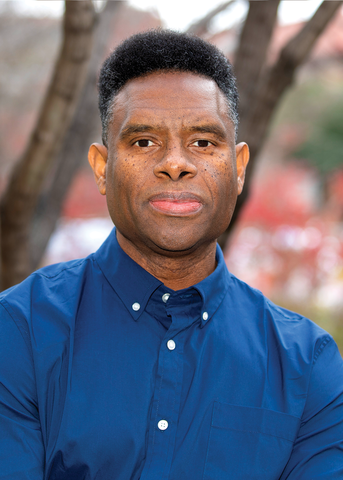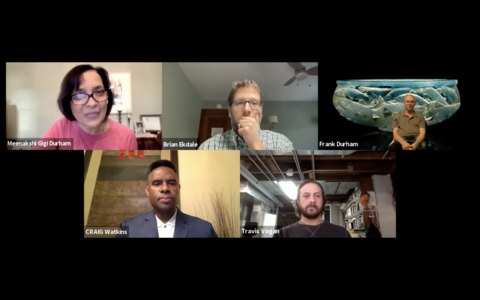S. Craig Watkins delivered the 2021 M. Holly McGranahan Lecture on April 15, focusing his talk on the triumphs and dilemmas of Black digital life.
The event took place over Zoom at 7 pm April 15, and was attended by 26 journalism professors, graduate students, and undergraduates. Watkins’ presentation lasted until 8:30 and concluded with questions from the audience.

The M. Holly McGranahan lecture is hosted once a semester by the University of Iowa School of Journalism and Mass Communication. Funded by a donation from Carl and M. Holly McGranahan, the event features a prominent figure in the field of journalism and mass communication whose research deals with important topics in media for that year. SJMC Professors Meenakshi Gigi Durham, Brian Ekdale, and Rachel Young select the lecturer each year based on suggestions from other faculty.
“We felt it was very important to find somebody whose work centered on racial issues,” Durham said. “This past fall we had Sarah Jackson, who’s at the University of Pennsylvania School of Communication, and she just wrote a book about hashtag activism, particularly from underrepresented groups. We’re trying to focus on media and racial justice issues this year.”
Watkins works as a professor at Moody College of Communication at University of Texas, Austin. Durham said that much of Watkins’ research focuses on people of color and their representation and involvement in the media, and that his most recent academic work focuses on social media and other online spaces.
“He’s the founding director of the Institute for Media Innovation at UT, and he’s the director of UT’s Good systems racial justice focus area,” Durham said. “He’s really not only involved as an academic but he’s doing a lot of on-the-ground policy work and educational work.”
Durham said she believes that learning about Watkins’s research will help prepare both undergraduates and graduate students for a quickly changing media landscape, which is crucial for future journalists and media scholars.
“We have a lot of graduate students who are really interested in the social media environment, and so his perceptions and insights into, especially African-Americans and their uses of social media and both the progressive aspects of it as well as the negative aspects of it, will be really important for informing these young researchers who will be the scholars of the future,” she said.
Watkins’ lecture focused on the ways that marginalized communities have engaged with social media and new technologies, making spaces for themselves and often being innovators of new technologies.
One example of this phenomenon Watkins referenced is “Black Twitter,” a community of mostly African American Twitter users that were early adopters of the platform. Watkins said African Americans were some of the first people to use Twitter for creative expression and political engagement, shaping much of the function and lingo of the platform.

“So when Twitter was created, [those inside] never imagined African Americans would be early adopters, never would have imagined that African Americans would in some ways begin to establish the tone and parameters, how we might use a platform like Twitter,” he said.
Watkins’ 2019 book, Don’t Knock the Hustle, which he referenced often during the lecture, details how young creatives, particularly from marginalized communities, have harnessed new technologies to skirt barriers to success and engagement.
One of the defining attributes of Black digital life, Watkins said, has been the ability to generate social movements and activism using social media. Black Lives Matter, largely born online, was among the first global social movements of the 21st century.
“This sense of creativity, the kind of bold vision that African Americans have brought to their use and deployment of social media by the ways in which they engage digital platforms, and how it in some ways characterizes the complex features of Black digital life, are manifest in many different ways through how we think about politics,” he said.
Watkins also touched on many of the problems marginalized populations face in digital spaces, including inequity in access to the internet and online racism and trolling.
The “mobile paradox” is one example Watkins gave. As mobile devices became widespread, Black and Latinx people were more likely to grow up in households that only had internet access through mobile devices. This constrained how people were able to use the internet, creating a gap in equity even as it closed a gap in access.
“In some ways, this paradox of both being connected, and yet still facing a number of different social, educational and economic constraints and hence, this notion of the mobile paradox,” he said.
Story by students Caleb McCullough and Kyle Petrie